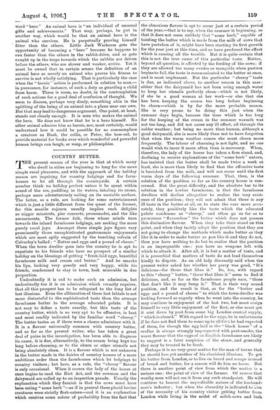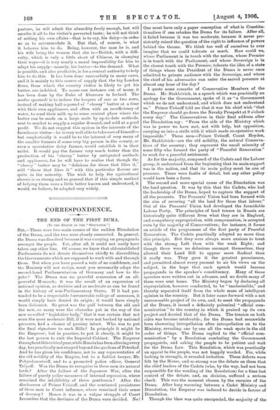COUNTRY BUTTER.
THE present season of the year is that at which many who dwell in cities are beginning to long for the more simple rural pleasures, and with the approach of the holiday season are inquiring for country lodgings and for farm- houses to let all through the countryside. A certain number think no holiday perfect unless it be spent within sound of the sea, paddling in its waters, inhaling its ozone, perhaps more adventurously sailing on its unstable surface. The latter, as a rule, are looking for some entertainment which is just a little different from the quest of the former, for this seaside sojourn usually implies such delights as nigger minstrels, pier concerts, promenades, and the like amusements. The former folk, those whose minds turn towards the inland farmhouse lodgings, are seeking the more purely rural joys. Amongst these simple joys figure very prominently those unsophisticated gastronomic enjoyments which are most aptly suggested by the touching refrain of Calverley's ballad : "Butter and eggs and a pound of cheese." When the town dweller goes into the country he is apt to expatiate to his friends who have no prospect of a similar holiday on the blessings of getting "fresh-laid eggs, beautiful farmhouse milk and cream and butter." And he smacks his lips, looking very greedy and very happy, while his friends, condemned to stay in town, look miserable in due broportion.
Undoubtedly it is sad to make such an admission, but undoubtedly too it is an admission which veracity requires, that all this prospect has to be relegated to the long list of lost illusions. Even the alliteration of these last labials is not more distasteful to the sophisticated taste than the average farmhouse butter to the average educated palate. It is not easy to define a taste exactly, but this taste of the country butter, which is so very apt to be offensive, is best and most readily indicated by the familiar word "cheesy." The butter tastes as if there were a cheese admixture with it. It is a flavour universally common with country butter, and so far as the present writer, who has taken a great deal of pains in the investigation, has been able to diagnose its cause, it is due, alternatively, to the cream being kept too long before churning, or to the churn or other utensils not being absolutely clean. It is a flavour which is not unknown in the butter made in the dairies of country houses of a more ambitious order than the farmhouses which let lodgings to country visitors ; but here; as a rule, the " cheesy " flavour is only occasional. When it occurs the lady of the house at once begins to read the Riot Act, and the cowman and the dairymaid are called up to an inspection parade. Usually the explanation which they furnish is that the cows must have been eating "some herb "—as if in general these placid bovine creatures were strictly flesh-eaters—and it is an explanation which receives some colour of probability from the fact that
the obnoxious flavour is apt to occur just at a certain period of the year,—that is to say, when the summer is beginning, so that it does not seem unlikely that "some herb," capable of tainting the butter which is made from the milk of cows that have partaken of it, might have been starting its first growth for the year just at this time, and so have produced the effect which is causing all the trouble. But it is quite certain that this is not the true cause of this particular taste. Butter, beyond all question, is affected by the feeding of the cows ; if they are allowed too many swedes or maugolds when pasture begins to fail, the taste is communicated to the butter at once, and is most unpleasant. But the particular " cheesy " taste is due, as indicated above, to another reason in this case : either that the dairymaid has not been using enough water to keep her utensils perfectly clean—which is not likely, if she be a good woman at her work—or else that she has been keeping the cream too long before beginning to churn—which is by far the more probable reason. She is very Drone to be doing this just when the summer days begin, because the time which is too long for the keeping of the cream in the summer warmth was not too long, and did not cause any ill effect, all through the colder weather; but being no more than human, although a good dairymaid, she is more likely than not to have forgotten that when the warm weather comes she must churn more frequently. The labour of churning is not light, and no one would wish to incur it more often than is necessary. When, therefore, the lady of the house has taken a firm stand, and, declining to receive explanations of the "some herb" nature, has insisted that the butter shall be made twice a week at least, she is more than likely to find that the offensive taste is banished from the milk, and will not recur until the first warm days of the following summer. That, then, is the solution of the problem so far as the country house is con- cerned. But the great difficulty, and the absolute bar to its solution in the lowlier farmhouse, is that the farmhouse dwellers will decline altogether to realise the very exist- ence of the problem ; they will not admit that there is any ill taste in the butter at all, or, to state the case more accu- rately, they positively like the taste which the educated palate condemns as "cheesy," and often go so far as to pronounce "flavourless" the butter which does not possess this distinctive flavour. When they take their stand on this point, and when they tacitly adopt the position that they are not going to change the methods which make butter as they like it in order to make butter as you like it and they do not, then you have nothing to do but to realise that the position is an impregnable one : you have no weapons left with which to attack it. After all, it is but a matter of taste, and it is proverbial that matters of taste do not lend themselves kindly to dispute. As an old lady discreetly said when the present writer asked her whether her perry was good, "It's delicious—for those that likes it." So, too, with regard to this "cheesy" butter, "those that likes it" seem to find it delicious, and, so far as the farmhouse people care, "those that don't like it may lump it" That is their very sound position, and the result is that, as for the "butter and eggs and a pound of cheese" to which the town-dweller was looking forward so eagerly when he went into the country, he may continue in enjoyment of the last two, but must resign himself to very little enjoyment of the first, or else must get it sent down by post from some big London central supply, "which is absurd." With regard to the eggs, he is unfortunate if he does not find them to come up to all tur!..-. he had expected of them, for though the egg laid in the "black house" of a crofter is always strongly impregnated with peat-smoke, the worst flavour that the eggs of an English farmhouse are likely to suggest is a faint suspicion of the straw, and generally they may be trusted to be fresh.
Perhaps it is no very great matter for the man of towns that be should lose yet another of his cherished illusions. To get his butter from London, or to live on bread and scrape instead of bread and butter, for a season will do him no harm. But there is another point of view from which the matter is a serious one: the point of yiew of the farmer. Of course that worthy man will not see it from any such standpoint. He will continue to lament the unprofitable nature of the husband. man's industry ; but when the absurdity is indicated to IinA of the necessity of his country visitor getting butter from London while living in the midst of milch-cows and lush pasture, he will admit the absurdity freely enough, but will ascribe it all to the visitor's perverted taste ; he will not think of setting his own affairs—that is to say, his dairy—in order so as to accommodate it. But that, of course, is what it behoves him to do. Being, however, the man he is, and his wife being the woman that she is—British, with a diffi- culty, which is only a little short of Chinese, in changing their ways—it is very nearly a moral impossibility for him to adapt his supply—namely, his butter—to the demand. What is possible, aud also profitable, is for a central authority to help him to do this. It has been done successfully in many cases, and it is mainly to this source of supply that the big London firms, from which the country visitor is likely to get his butter, are indebted. To name one instance out of many, it has been done by the Duke of Abercorn in Ireland. The modus operandi is to induce the keepers of one or two cows, instead of making half-a-pound or "cheesy" butter at a time with their own appliances, and often with an insufficiency of water, to send their milk up to some central place where the butter can be made on a large scale by up-to-date methods, sent to market to supply a regular demand, and sold at a good profit. We do not suggest this system in the interests of the farmhouse visitor—he is very well able to take care of himself— but emphatically it would be to the interest of very many of the smaller farmers if sonic very big person in the county, or even a speculative dairy farmer, would establish it in their midst. It would pay the farmer very much better than the production of his "cheesy" butter by antiquated methods and appliances, for be will have to realise that though the "cheesy" butter may be "delicious for those that likes it,'' still "those that likes it" with this particular flavour are quite in the minority. The wish to help the agricultural classes is so strong and so general that if this simple method of helping them were a little better known and understood, it would, we believe, be adopted very widely.







































 Previous page
Previous page